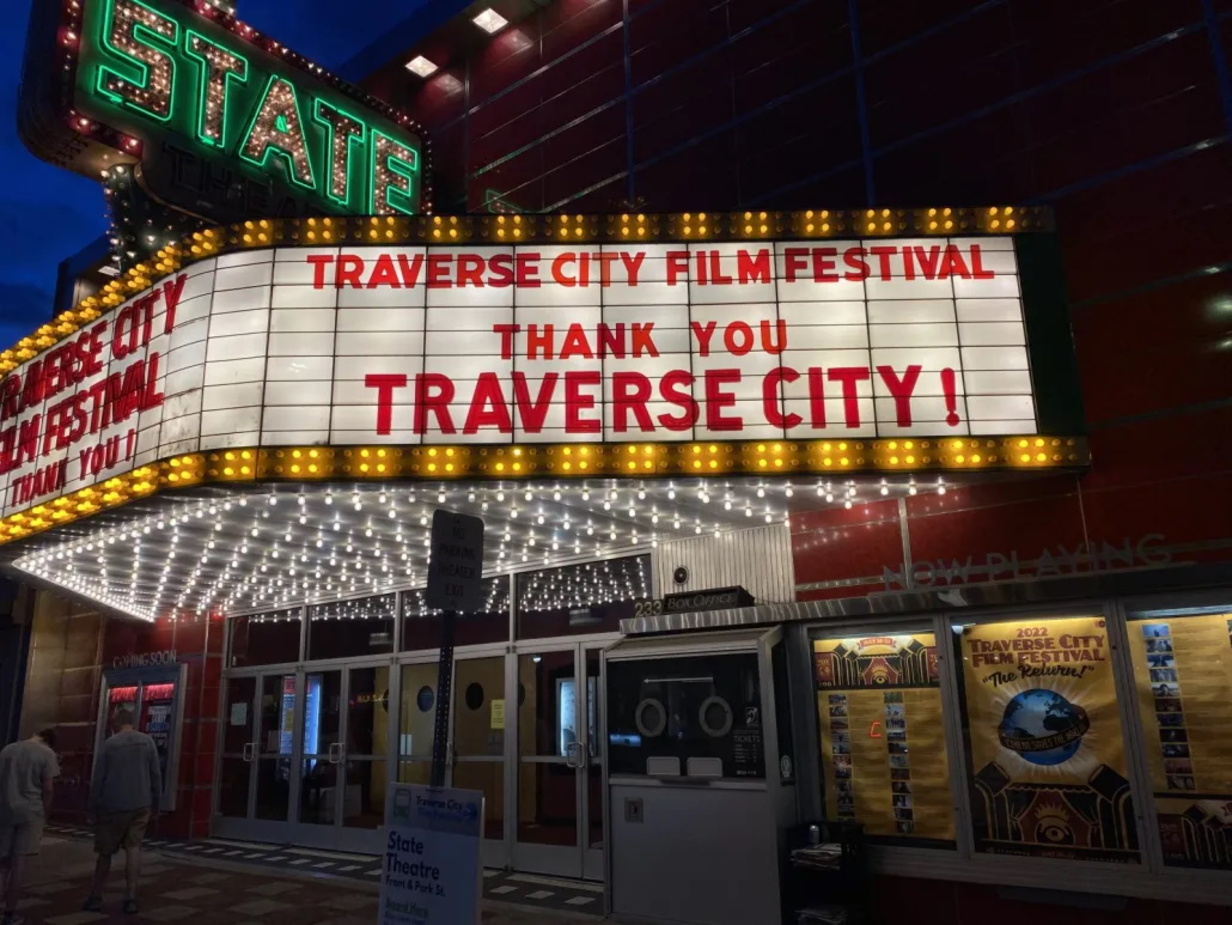
Not Ending, Just Changing: Michael Moore Talks Traverse City Film Fest Future
By Craig Manning | May 13, 2023
“We’re not going anywhere. We’re not done.”
So says Michael Moore, co-founder of the Traverse City Film Festival (TCFF), when reached for a lengthy phone conversation on Wednesday afternoon. In his first big interview with the media since last week’s announcement that TCFF had arrived at the end of an era and would be ending its traditional summertime festival, Moore tells The Ticker that his words have been misinterpreted – and that the organization still has big plans for continuing film festival programming in Traverse City going forward.
“The word ‘end’ does not appear once in last week’s letter,” Moore says. “I talk about concluding one era, so we can move into the next with the festival and the theaters. And I talk about why we’re doing that. But TCFF is not discontinued. We’re just going to do things differently.”
On May 2, Moore announced that the TCFF board had “decided, after much heartfelt discussion, that it’s best to close this era of the film fest now while we’re ahead, no longer in debt, and go out on top with many years of fond memories that we will all collectively cherish for the rest of our lives.” The widespread interpretation of the news – locally and beyond – was that the festival was coming to an end, and that TCFF as an organization would focus its efforts instead on the two downtown movie houses it manages, the State Theatre and the Bijou by the Bay.
While Moore reiterates that the theaters will be TCFF’s top priority going forward, he’s not closing the door on festival or festival-like programming. What that programming will look like is currently up in the air, with the TCFF board bandying about a variety of ideas that Moore shared with The Ticker with the caveat that nothing is set in stone and the various concepts are merely “under consideration” for now.
“Instead of having one week in the summer, what if we did three or four festivals each year?” Moore asks. Those festivals would be smaller-scale than the TCFF of old, and wouldn’t utilize venues like Lars Hockstad Auditorium, the City Opera House, Old Town Playhouse, or Milliken Auditorium. (TCFF also skipped those venues last year, due to the cost of converting them into temporary movie theaters.) Instead, Moore says the festivals would cluster films at the State and Bijou, with the option to partner with AMC – another TCFF 2022 first – to get more screens.
“We could have a winter festival, and a fall festival, and a spring festival,” Moore muses. “And maybe they’re more specific in their themes. For instance, in the fall, we could do an annual horror festival that would be packed. That could be the last weekend of October.”
Another idea on the table is what Moore calls “TCFF Tuesdays,” which he compares in concept to what the National Writers Series does.
“Doug and Anne Stanton refer to their writing series as a year-round book festival, which is genius,” Moore says. “We’re going to look at the State as a year-round film festival, and that’s the way we’re going to program it. We’re kicking around the idea of TCFF Tuesdays, where every Tuesday, 52 Tuesdays a year, we would bring what we would have brought, say, this summer at the festival. And we’d love to set those screenings up with the filmmaker present, or if not present, then Zooming in.”
In a similar vein, Moore wants to bring back “Doc Night,” an old Monday evening State Theatre tradition which spotlighted documentaries that are often difficult to see elsewhere.
Those types of shifts would be part of a broader reimagining of the State and Bijou programming strategy, which Moore says is already underway.
Once upon a time, it wasn’t uncommon for the State alone to program 30 showtimes per week – including one or two mainline films, discount showings of kids films or Hollywood classics, late-night “Friday Night Flicks,” live transmissions from the Metropolitan Opera, and more. But in the past seven days, between Guardians of the Galaxy Vol. 3 at the State, What’s Love Got to Do with It? at the Bijou, and a Saturday morning kids screening of Annie, there were just 19 showtimes across the two theaters.
Per Moore, the TCFF organization is currently playing around with its schedule, trying to find a balance between operational costs and local audience demand. While he says the 30-showings-per-week model of the early 2010s is “gone” – due to factors ranging from declining theater demand nationwide to the fact that Hollywood is simply producing fewer theatrical films in the wake of COVID-19 – his goal is for both theaters to get back to “at least three shows a day,” seven days a week, all year round.
“We are in a different mindset now, of how do we run a nonprofit operation without going into debt?” Moore explains. “Right now, we're in the black, and our intention is to stay in the black. And we will not have a single screening that’s going to put us in the red.”
That desire to avoid big financial risk is ultimately what led the TCFF board to pull the plug on the traditional film festival for this summer. While Moore wrote in his initial announcement that last year’s festival “broke even for the first time in years,” he tells The Ticker that keeping the typical TCFF model intact and steering clear of debt this year was going to be tough for one big reason: the Open Space movie tradition.
“The Open Space costs us $200,000 for that week, and we’ve agreed we would never charge for those Open Space films,” Moore says. “But it got to the point where, if we did the festival this year, we’d have to cut out the Open Space, because we don’t have that extra $200,000 anymore. When we started, Ben & Jerry’s were the underwriter, so that we wouldn’t lose money on the Open Space films. We need an underwriter or sponsor now to bring the Open Space back.”
When asked for their reactions on TCFF’s “end of an era” news, leaders in local government, tourism, and economic development all say they’re bullish about what the new chapter could mean.
Downtown Development Authority CEO Jean Derenzy, for instance, is optimistic that a redoubled focus on the State and the Bijou as year-round draws will help bring more energy and excitement back to downtown. City Commissioner and Mayor Pro Tem Amy Shamroe, meanwhile, is hopeful that TCFF’s emphasis on bringing back a broader diversity of programming will also mean more opportunities for other organizations to use the theaters for panels, town halls, special film screenings, or other events.
For Traverse City Tourism President Trevor Tkach, TCFF’s pivot means an open slot in the area’s tourism calendar. And while Tkach says replacing the economic benefit of an “annualized” name-brand event like TCFF will be challenging, he also sees an opportunity for other people or organizations to bring new celebrations to the table, assuming TCFF chooses to focus its efforts on other parts of the calendar.
“I will say, what has started to bubble up is a community conversation about how we continue to celebrate film during [that first week of August],” Tkach says. “That week has become a traditional week to celebrate arts and film and community here in Traverse City. I think a lot of people want to see that continue in some capacity, and I wouldn't be shocked if, over the coming weeks, you see this community rally and certain people step up to try to do something to continue to showcase our passion for the arts.”
Comment






